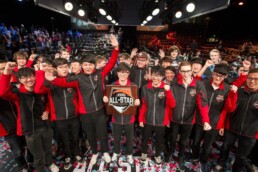South Korea is the birthplace of Esports. Competitive gaming has been around since the 1980s. However, true Esports which included pro-gamers, sponsors, and huge spectatorship really exploded thanks to Starcraft and its expansion pack Starcraft: Brood War. This game was massively popular in South Korea due to its real-time strategy gameplay that involved fast reflexes and muscle memory. As Esports in Korea continued to grow with newer and newer strategy games, more and more Esports Organizations in Korea have been established. Now Esports is a multi-billion-dollar industry with a massive online following with South Korea leading the way.
Esports has grown faster in Korea than in any other country. It has also played a major role in the booming gaming market in Korea. Estimates show that South Korea’s gaming industry is worth over $7 billion. Which represents over 60% of Korea’s cultural content industry. Koreans gather to watch their favorite pro gamers compete at the highest level. Esports organizations in Korea play an important role in working as competition organizers, rights holders, and content creators. These organizations are responsible for financing an Esports tournament in Korea through brand partnerships, sponsorships, and distributing the content to steaming and social media platforms. Therefore, these Esports organizations in Korea that organize and host professional tournaments and leagues are vital to the Esports industry not just in Korea but worldwide.
A Complete List of Esports Organizations in Korea
KeSPA

KeSPA is the Korea Esports Association, a South Korean association that manages Esports in South Korea. They were created by the Ministry of Culture, Sports, and Tourism. This was the Korean government’s way of getting ahead of the curve back in 2000. KeSPA is responsible for managing large Esports events. They are members of the Korean Olympic Committee and the International Esports Federation. Currently, they are the managing body for over 25 Esports in South Korea such as Starcraft 2, League of Legends, and Counter-Strike just to name a few. They have played a major role in covering Starcraft Brood War and Starcraft 2 in Korea. KeSPA holds a yearly tournament called KeSPA Cup.
IEOC Korea
 IEOC stands for the International Esports Omnipotent Committee. They are headquartered in London, England, and have already partnered with over 70 countries to grow Esports. IEOC Korea is focused on supporting Esports in South Korea by holding regional tournaments across Korea. The IEOC held its first international tournament in Tokyo back in 2020. Their ultimate goal is to create an Olympic-type tournament that covers a wide range of games with players representing their country. Basically, they are creating an Olympic for Esports. They are focused on finding young amateur talent from across the globe and becoming the top organization for fostering and nurturing the next up-and-coming pro gamer.
IEOC stands for the International Esports Omnipotent Committee. They are headquartered in London, England, and have already partnered with over 70 countries to grow Esports. IEOC Korea is focused on supporting Esports in South Korea by holding regional tournaments across Korea. The IEOC held its first international tournament in Tokyo back in 2020. Their ultimate goal is to create an Olympic-type tournament that covers a wide range of games with players representing their country. Basically, they are creating an Olympic for Esports. They are focused on finding young amateur talent from across the globe and becoming the top organization for fostering and nurturing the next up-and-coming pro gamer.
While many in the United States see gaming as more of a hobby played at home, Korea, and especially Seoul is filled with PC Bangs that bring in gamers looking to become the next big pro gamer. IEOC aims to find young talent all across the world and bring Esports to the mainstream.
The IEOC recruits committee members for each country. Therefore, they will represent their own country and their job will be to search for and secure a National Team for all game categories for the upcoming IEOC Global Tournament. In addition, each country will have its own IEOC National Director to raise sponsorships funds to support each National team to travel and play in these tournaments safely.
IESF
 The IESF stands for the International Esports Federation. They are located in South Korea and they promote Esports by hosting meetings and the yearly IESF World Championship. They currently have over 50 countries in their federation. Besides hosting international Esports tournaments, they establish standards for Esports referees, players, and competitions. In addition, they even have a school for Esports referees called the International Esports Referee Academy in Busan.
The IESF stands for the International Esports Federation. They are located in South Korea and they promote Esports by hosting meetings and the yearly IESF World Championship. They currently have over 50 countries in their federation. Besides hosting international Esports tournaments, they establish standards for Esports referees, players, and competitions. In addition, they even have a school for Esports referees called the International Esports Referee Academy in Busan.
Esports Education and Youth Leadership Commission
IESF created the Esports Education and Youth Leadership Commission to expand the Esports ecosystem and its presence within schools. It consists of three committees including students, academics, and administrators. The commission is being led by the Founder of Turkey’s Collegiate Esports League Serhat Bekdemir. It will focus on advocating for the introduction of Esports into educational curriculums. The commission creates its own materials and courses to support education and learning to empower young people to follow a career in Esports. Furthermore, the courses focus on the business side of Esports such as how to run an Esports tournament, staying up to date on Esports regulations, and marketing in Esports.
LCK
 LCK stands for League of Legends Champions Korea. They are the top organization for League of Legends Esports in South Korea. They run two seasons per year and have 10 teams. The LCK is administered in cooperation with KeSPA and Riot Games. Their aim is to serve as a direct route for League of Legends pro-gamers in Korea to enter the League of Legends World Championship. SK Telecom T1 is the current League of Legends champion. Furthermore, T1 is the home for Faker who is regarded as the best League of Legends player in the world.
LCK stands for League of Legends Champions Korea. They are the top organization for League of Legends Esports in South Korea. They run two seasons per year and have 10 teams. The LCK is administered in cooperation with KeSPA and Riot Games. Their aim is to serve as a direct route for League of Legends pro-gamers in Korea to enter the League of Legends World Championship. SK Telecom T1 is the current League of Legends champion. Furthermore, T1 is the home for Faker who is regarded as the best League of Legends player in the world.
Their 2020 Woori Bank LoL Champions Korea Summer Competition was held online due to COVID-19. LCK runs the regional qualifiers for the League of Legends World Championship which takes place towards the end of the year.
The Top Global Esports Organization
Outside of Korea, Esports does not yet have an established governing body for Esports. The top global organizations that are making their case for being the governing body for Esports are the IEOS, IeSF, and WESA. They all have the same goal of uniting the global Esports industry under one jurisdiction. As Esports continues its rise and continues to generate billions of dollars, it is only a matter of time before the International Olympic Committee (IOC) puts Esports on the Olympic stage. One of the major hurdles is that the IOC wants to focus on traditional sports video games like FIFA and less on violent video games which would run counter to Olympic values. These violent video games will most likely need an Esports organization of their own which is where the IEOS, IeSF, and WESA come into play.
Esports is now bigger than ever. The 2019 Dota 2 International and the 2019 Fortnite World Cup surpassed $30 million in prize money, a record high. The global Esports market is a multi-billion-dollar industry. Big brand corporations are getting into Esports. Therefore, global corporations such as Red Bull, Audi, Samsung, and even Mountain Dew to name a few. The audience is bigger than ever at an estimated 450 million with more than half coming from Asia. More and more youths are looking to become pro gamers. As the mobile gaming market in South Korea continues to grow, Esports could also come to mobile. Therefore, the organization that represents Esports globally should come from Asia, more specifically from South Korea, the birthplace of Esports.
Related Posts





